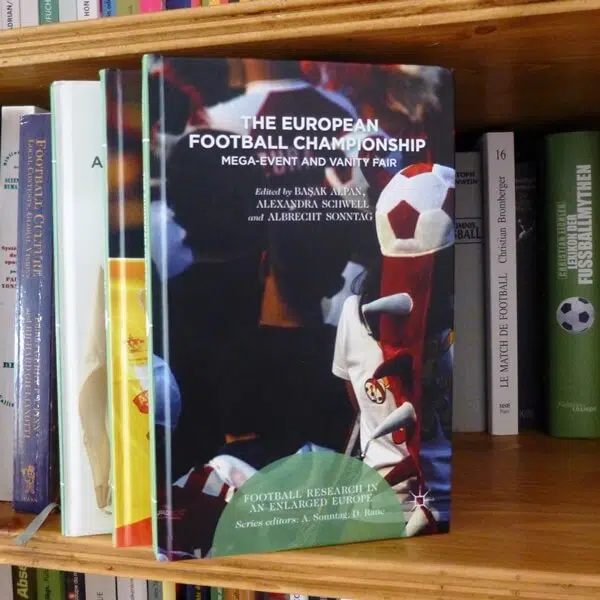‘Vanity Fair, where you light on the strangest contrasts laughable and tearful: where you may be gentle and pathetic, or savage and cynical with perfect propriety…’
Vanity Fair, Chapter XVII
In the middle of the 19th century, William Makepeace Thackeray published a long serialised novel in the satirical magazine Punch, which he named Vanity Fair. He borrowed his title from John Bunyan’s allegory The Pilgrim’s Progress (1678), where ‘Vanity Fair’ is one of the stations on the journey of redemption towards the ‘Celestial City’. It may be assumed that W.M. Thackeray chose this title because it not only allowed him to resume his vision of the human condition in a snappy expression but at the same time positioned himself as a detached and sarcastic observer of the human species, made up by individuals frantically running around in their absurd search for self-esteem and pride.
What would he say today on watching an event like the European football championship? Would he see, like in his famous novel, a ‘vain, wicked, foolish place, full of all sorts of humbugs and falsenesses and pretensions’ or would he be inclined to show more leniency in his judgement? Would he point out, with the biting irony that characterised his writing, the excessive proportions of this mega-event ? Would he see nothing but a big bustling fair of stereotypes upheld against better knowledge, a carnival of emotions shamelessly unleashed in public, a festival of the permanently noisy display of imaginary loyalties? Or would he detect, behind the Babylonian confusion, the joyful celebration of an extraordinary game and the simple pleasure of the masses to find themselves, for once, united by shared passion?
William Makepeace Thackeray never knew modern football. He died at age fifty-two, in December 1863 in London, exactly at the same moment where, at the other end of town, the eleven representatives of pioneering football clubs and schools were about to come to an agreement on the rules of this new game which they had set out to codify a few weeks earlier. If he had attended one of their meetings at the Freemasons’ Tavern in Covent Garden, could he only have imagined what kind of ‘vanity fair’ this new sport would produce one and a half centuries later?
It is perfectly possible, though, that the Victorian novelist, had he been miraculously ‘beamed’ to the Poland of 2012, would not have felt out of place. After all, he certainly was, together with the London society of his times and his famous colleagues Charles Dickens, Charlotte Brontë or Lewis Carroll, an arduous visitor of the Great Exhibition of 1851, the first ever ‘World Fair’. A genuine mega-event avant la lettre, hosted in the spectacular ‘Crystal Palace’ which received his nickname from the satirical plumes of Punch, where Thackeray had just published his novel. One may therefore assume that the great writer would readily engage in dressing parallels between the ‘Great Exhibition’ of 1851 and the great European football exhibition of 2012. Both can be perceived as great opportunities for the host nations to showcase their achievements and indulge in a good dose of self-celebration – a ‘Vanity Fair’ in the crudest sense of the word. He would no doubt be impressed by the number of travellers converging on the host cities from all over the continent. True, he might be intrigued by the fact that the centre of interest of this huge fair was only a ball game, and a rather simple one at that. But then again, would it not only be logical that the industrial machines and inventions of the 19th century were finally replaced as the object of worship by something even more trivial or ‘vain’? As a matter of fact, it would only strengthen his point about the inherent stupidity of mankind, a vision that left him, in his own words, ‘more melancholy than mirthful’.
It is striking to see to what extent the great literary works of the 19th and early 20th century may provide us with keys for the understanding of contemporary society. If these novels and their characters still have something to say about the society we are living in, it is not only because their authors had outstanding skills of psychological empathy with their protagonists, but also because the psycho-social programming of the human mind, its desires, fears and aspirations, do not seem to have changed that much since the days of Thackeray. Large social groups still have the same hunger for collective pride, which is still mainly satisfied through the identification with nation-states. They still have the same need for the ‘social self-love’ that Emile Durkheim considered inseparable from the very existence of nation-states; they still have the same urge to claim their community’s singularity that Isaiah Berlin identified as one of the most irrepressible drives of modern history.
Our new book on The European Football Championship brings together seven different accounts of visitors to the ‘Vanity Fair of European Football’ that took place in Poland and Ukraine in summer 2012. What they have in common despite their different national origins and their respective focus of interest is the impression of witnessing a period of transition and uncertainty. A period in which feelings of belonging are still framed by the stronghold of national identity, but where loyalties and identifications, but also dominant ideologies, are permanently negotiated and even publicly debated. A moment in time where representations of self and other are increasingly fluid, but where ‘blind spots’ stubbornly persist. A phase in which collective stereotypes, self-perceptions and ‘vanities’ are considerably weakened by large-scale phenomena like migration, cultural globalisation and supranational integration. The ‘Vanity Fair of European Football’ thus reveals itself as an ideal laboratory for the social scientist, where individuals and groups converge to redefine themselves and interact with each other, where, as Thackeray said, ‘the strangest contrasts laughable and tearful’ are laid out before the eyes of the researcher. It is certainly a place that William Makepeace Thackeray would have very much appreciated visiting. Behind his sarcastic description of the manifold weaknesses and follies of the human species that he examined like a biologist examines insects under his magnifying glass, Thackeray had a great compassion for their vain pursuits. With such interest for detail, capacity for empathy, and sense of humour, he would most certainly have made an excellent football anthropologist.
More on the book here.
An interview with the co-editors here.




